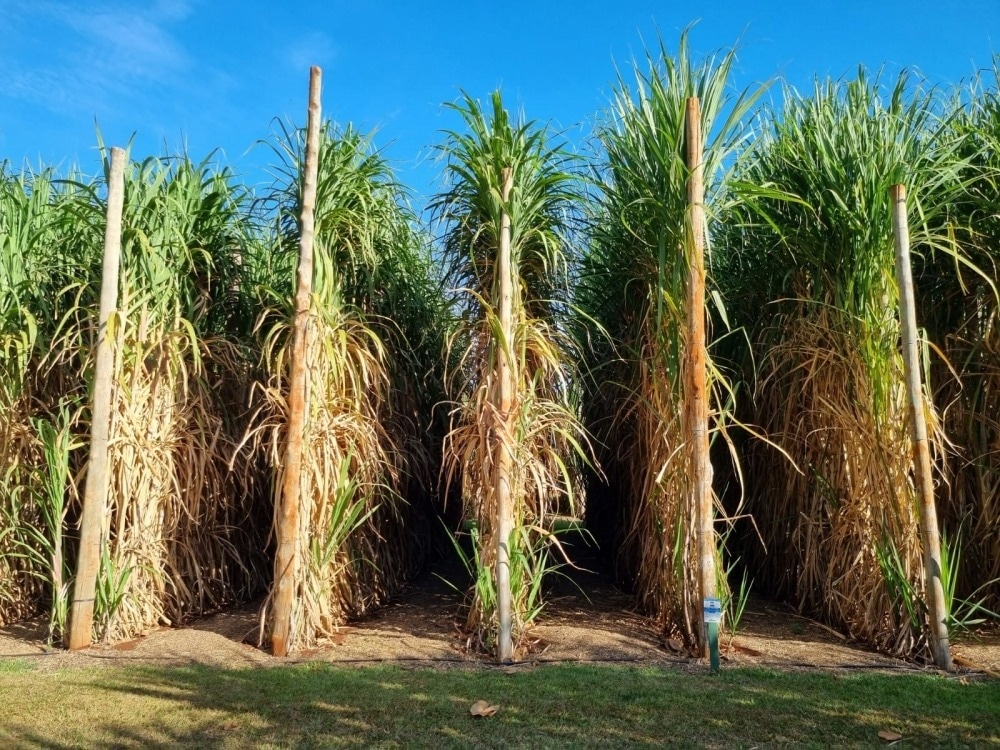Reviewed by Danielle Ellis, B.Sc.Sep 28 2022
Saccharum spontaneum, a species of wild sugarcane with exceptional resistance to biotic stresses like nematodes, fungi, bacteria, and other pests and diseases, as well as abiotic stresses like cold, drought, salinity, and nutritionally deficient soil, was the subject of a study at the State University of Campinas (UNICAMP) in Brazil.
 A study conducted at the State University of Campinas provides a foundation for future research to confirm identification of the best candidate genes for biotech applications such as insertion into commercially valuable plants and development of sugarcane varieties resistant to environmental pressures. Image Credit: Luciana Rossini/IAC, Sugarcane Center, Ribeirão Preto
A study conducted at the State University of Campinas provides a foundation for future research to confirm identification of the best candidate genes for biotech applications such as insertion into commercially valuable plants and development of sugarcane varieties resistant to environmental pressures. Image Credit: Luciana Rossini/IAC, Sugarcane Center, Ribeirão Preto
The researchers wanted to see if the orphan genes in S. spontaneum had a substantial role in its stress resistance properties, according to a study published in the journal Frontiers in Plant Science.
Every living thing possesses genes that closely match the genomes of other creatures. For instance, genes involved in photosynthesis are shared by plants. The majority of organisms also have orphan- or lineage-specific genes, on the other hand.
A taxonomic group’s orphan genes are those that share little to no sequence similarity with genes from other lineages. For this reason, they are also referred to as taxonomically restricted genes.
For instance, certain genes in birds are very different from those in mammals. Recent studies have demonstrated that even organisms in closely related species within the same genus can possess genes that are unique to their particular species.
Due to traits like previous whole-genome duplication occurrences that led to multiple copies of the same gene, the researchers were intrigued by S. spontaneum. According to scientific research, orphan genes can develop from copies of already-existing genes whose sequences eventually diverge completely from the original sequences as a result of mutations over time.
Reorganization of genomic areas that do not contain genes, which is regularly observed in organisms with complex genomes, such as sugarcane, could be another explanation for the formation of orphan genes.
In the study, we identified parts of the genome of S. spontaneum that have no similarities to genes in any other organism. We believe they may be responsible for physiological traits or properties peculiar to the species.”
Cláudio Benício Cardoso-Silva, Study First Author, Universidade Estadual de Campinas
With the assistance of FAPESP, Cardoso-Silva carried out the experiment as postdoctoral research at UNICAMP’s Center for Molecular Biology and Genetic Engineering (CBMEG).
Cardoso-Silva added, “As these plants evolved, some genes were expressed to a greater or lesser extent in response to various types of abiotic stress, particularly cold. This may mean they’re regulated as a result of these stresses.”
Anete Pereira de Souza, Professor of Plant Genetics at UNICAMP’s Institute of Biology and the study’s last author, oversaw Cardoso-Silva’s postdoctoral research.
According to the study’s findings, the researchers do not think they can definitively state that the orphan genes they discovered increase the plant’s tolerance to stress.
“But the fact that they are regulated under conditions of stress serves as an alert to the possibility that they may play an important role in these processes,” further added Cardoso-Silva.
The next step will be to conduct experiments on plants that have been subjected to various stresses to examine how orphan genes behave in terms of expression when compared to plants that have not been challenged.
In the future, it could be possible to create sugarcane varieties that are more resilient to environmental stressors by studying biotech applications involving their insertion into economically valuable plants after the best candidate genes have been proven.
“We shone a spotlight on this possibility for anyone who wants to use the data in the article to continue the research, or for scientists who work with gene transformation and editing, which is a different research field, to choose one or two genes as candidates and do the validation. My current research focuses on the evolutionary aspect of gene family expansion,” added Cardoso-Silva.
At the State University of Northern Rio de Janeiro (UENF), he is still engaged in genomic research.
With a fellowship from FAPESP, Cardoso-Silva studied for a full year at the University of British Columbia in Vancouver, Canada.
Today we have CRISPR [the gene editing technique], which offers biotech professionals a chance to select genes for tolerance of drought, salinity, cold or heat at a time when crop resilience with fewer inputs is paramount.”
Anete Pereira de Souza, Study Last Author and Professor, Plant Genetics, Institute of Biology, Universidade Estadual de Campinas
Source:
Journal reference:
Cardoso-Silva, C. B., et al. (2022). Taxonomically Restricted Genes Are Associated With Responses to Biotic and Abiotic Stresses in Sugarcane (Saccharum spp.). Frontiers in Plant Science. doi.org/10.3389/fpls.2022.923069.